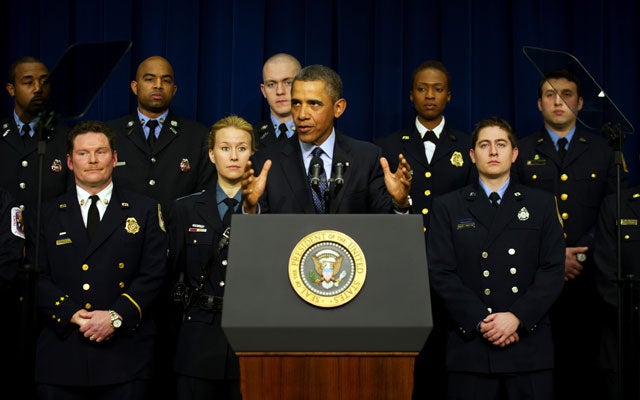If you had to cut your family’s budget, where would you cut?
Would you immediately start starving your children and stop wearing shoes? Of course not. You would look at the extras in your life—whether they were coffee shop lattes, movie tickets, or restaurant meals.
It’s a good thing the President wouldn’t be handling your budget. As Dan Holler of our sister organization, Heritage Action for America, has said: “If President Obama were making the decision for your family… he’d tell you to stop buying gas for your car and explain how you could only eat five days a week.”
Now that President Obama has turned against sequestration, he is suggesting that spending cuts to federal agencies must result in dire consequences. Firefighters, emergency responders, and teachers will all be cut, he claims. Media outlets have played up these sob stories, copying White House releases in their local news stories and soliciting sad testimonials from people who supposedly would be affected by these cuts.
But the question remains: Why would federal agencies cut their most vital assets instead of trimming around the edges? After all, the sequestration cuts are only 2.4 percent of federal spending.
Take a couple of examples.
President Obama said that “Air traffic controllers and airport security will see cutbacks, which means more delays at airports across the country.”
It won’t come as a surprise to most Americans that there is waste and inefficiency at the Transportation Security Administration (TSA). In fact, a congressional report “found that TSA is wasting hundreds of millions of taxpayer dollars.” Another report found that the TSA “has continually grown its ranks despite fewer travelers.”
President Obama said that “Thousands of teachers and educators will be laid off.”
First of all, as Heritage researchers have pointed out, “No federal education program operated by the Department of Education directly funds teacher salaries—this is a state and local responsibility.” And there are plenty of programs where inefficiencies are burdening our education system. A congressional report listed a number of duplicative or ineffective education programs that could be cut.
As if these exaggerations weren’t enough, Reason.com reported that the Office of Management and Budget warned of sequestration cuts to an agency that doesn’t even exist. As Reason’s Mike Riggs noted, this raises questions about the accuracy of the Administration’s attempted impact statements.
There is one area where the sequestration cuts will have harsher impacts—national defense. Heritage has warned of the impact on military readiness and America’s ability to defend itself, because defense bears a much larger portion of the cuts than the rest of the budget. The President is now acting concerned about the military after paying it little mind throughout the sequestration debate, using a shipyard as his backdrop for today’s anti-sequestration pep talk.
It makes no sense to hit defense the hardest with these cuts, while sequestration leaves major entitlement programs like Social Security and Medicaid untouched. Congress should reprogram these spending cuts to target the waste and inefficiencies it has already identified in federal agencies—like those listed above. Heritage’s Patrick Louis Knudsen, the Grover M. Hermann Senior Fellow in Federal Budgetary Affairs, even helpfully outlined places to find $150 billion in spending cuts that would make a lot more sense.
So no, we don’t have to fire firefighters and teachers and airport screeners. What Congress should be doing is what every American family does—tightening its budget by cutting things that are unnecessary.
Read the Morning Bell and more en español every day at Heritage Libertad.
Quick Hits:
- Another blizzard is hitting middle America today after cutting off power to thousands in Texas, Oklahoma, and Kansas, the AP reports.
- “A rocket fired from Gaza exploded in Israel on Tuesday, the first such attack since a November truce,” reports Reuters.
- A series of tweets supporting gun control, aimed at members of Congress, appears to have been faked.
- The Senate is expected to vote today on the nomination of Chuck Hagel for Secretary of Defense.
- The Heritage Foundation is developing a plan to refine the conservative message so we can better communicate our proven ideas to the American people. Click here to find out more and how you can help by midnight tonight.
